Distrust holds them back
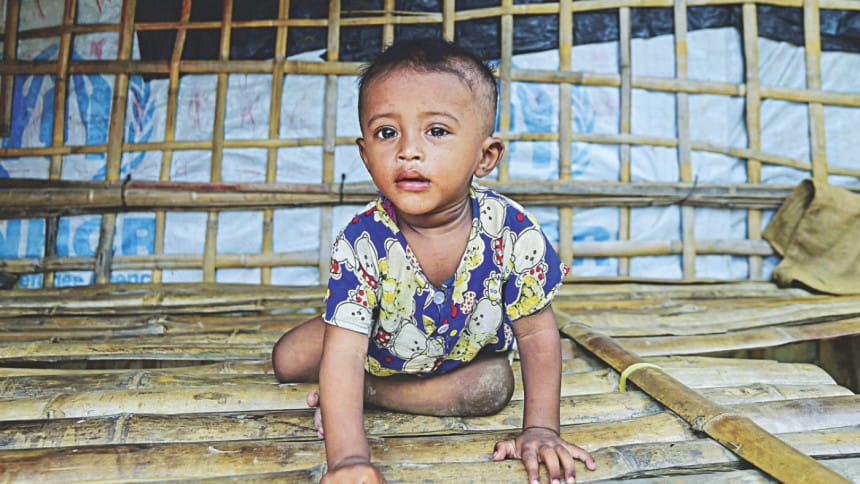
The failure of the second attempt to begin repatriating the Rohingyas has once again exposed Myanmar’s lack of sincerity, experts said.
Rohingyas say Myanmar has not taken into consideration any of their core demands -- guarantee of citizenship, recognition as an ethnic community, ensuring safety in Rakhine and other basic rights that they have been denied since 1982. Until these conditions are met, the Rohingyas will not be willing to go back.
The issues were raised time and again by rights groups, but nothing has been done.
“Myanmar is not serious at all. They are playing diplomacy and Bangladesh has fallen into its trap,” Prof Imtiaz Ahmed of International Relations at Dhaka University told The Daily Star yesterday.
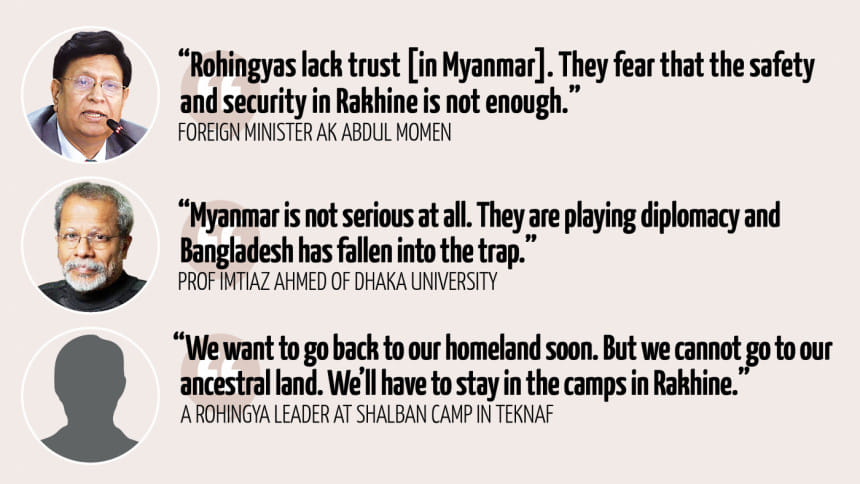
The most crucial thing Myanmar needs to do before repatriation is amend its 1982 law, which stripped the Rohingyas of citizenship.
“If Myanmar grants citizenship to the Rohingyas, they would automatically go back to Myanmar. They will realise that Myanmar truly wants them back,” said Imtiaz, also director of the Centre for Genocide Studies at the university.
Meanwhile, Rohingyas maintain that their needs have to be addressed for any repatriation to take place.
“We want to go back to our homeland soon. But the conditions there are not ready. We cannot go to our ancestral land. We’ll have to stay in the camps,” said a Rohingya leader from Shalban camp in Teknaf, requesting anonymity.
There is no guarantee that the Rohingyas would get citizenship if they return, he said, adding that they were still unsure of what kind of safety or security they would be given there.
The Rohingya leader is one of the 3,450 refugees cleared by Myanmar to return to the country. He had been interviewed by the UN refugee agency, the United Nations High Commissioner for Refugees (UNHCR), and the Refugee Relief and Repatriation Commissioner (RRRC).
The Rohingyas’ lack willingness to return was a recurring feature during the interviews, officially called intention surveys.
Refugee Relief and Repatriation Commissioner Mohammad Abul Kalam said that none of the Rohingyas of the 295 families interviewed by the UNHCR and RRRC over the last two days had volunteered to return.
“We have interviewed 295 families, but none has yet shown interest to return to Myanmar,” he told reporters at a camp in Teknaf around 12:30pm yesterday.
He added that the authorities were fully prepared to transport the Rohingyas to the two transit camps, where they would be temporarily sheltered before being handed over to Myanmar.
Myanmar had cleared the names of 3,450 Rohingyas from a list of 22,000 plus. In early August, Bangladesh provided the approved list to the UNHCR in Dhaka and sought its assistance in assessing their willingness to return to Myanmar.
Accordingly, officials of the UN High Commissioner for the Refugees (UNHCR) in Bangladesh and of the RRRC office conducted the assessment of 339 families out of 1,037 cleared by Myanmar.
“The process of assessing voluntariness will continue. We will see if anybody wants to return. The vehicles we have arranged [for their transportation to transit camps] will also remain ready,” Abul Kalam said.
On Myanmar’s efforts, Dhaka University’s Prof Imtiaz said a delegation from the country had visited Rohingya camps in July, while the Myanmar’s Independent Commission of Inquiry visited the camps this week.
“The purpose of all these initiatives, as well as the repatriation move, are attempts to prove in the UN General Assembly in September that it has been sincere. It has actually been not,” he said.
Myanmar is under pressure as two years have passed since the Rohingya influx and the International Criminal Court is moving to investigate the crimes, he said.
The first attempt at repatriation on November 15 last year also failed for similar reasons, as the Rohingyas had raised the same concerns and demands back then too.
‘A SERIOUS LACK OF TRUST’
Despite the mechanisms for the repatriation being ready, a lack of trust in Myanmar among the Rohingyas continues to exist.
“How can we believe we will be allowed to go to our houses?” a Rohingya man said, echoing many others living in some of the world’s largest refugee camps in Cox’s Bazar, home to some 1.1 lakh Rohingyas.
Over 742,000 of them fled military atrocities including killings, rapes, tortures, burning of houses in Rakhine State since August 25, 2017.
Foreign Minister AK Abdul Momen said it was regrettable that none of the Rohingyas interviewed as of yesterday was willing to return.
“Rohingyas lack trust [in Myanmar]. They fear that the safety and security in Rakhine is not enough. Therefore, the Rohingya leaders should be taken to Rakhine to prove that the situation there has improved,” Momen said.
“We were expecting repatriation to start. We are not losing hope. We’ll continue to work on repatriation.”
Asked about the Rohingyas’ demands, he said, “We cannot be held hostage to their demands. They have to achieve those after they return to their homeland.”
If the Rohingyas stay here longer, they won’t be comfortable, he said, adding that the Bangladesh government had already spent around Tk 2,500 crore for them and the donors may not be interested to release more funds in the future.
Meanwhile, in a statement yesterday, UNHCR said it appreciated the consistent commitment by the government of Bangladesh to ensure that the refugees’ decisions would be respected. UNHCR has agreed with Bangladesh and Myanmar that any repatriation of refugees must be voluntary, safe and dignified.
ARE ROHINGYAS BEING MISLED?
A parliamentary body yesterday asked the foreign ministry to find out whether any non-government organisation was misleading Rohingyas and convincing them to not return to Myanmar.
The parliamentary standing committee on the foreign ministry came up with the directive as several members of the House watchdog alleged that a number of NGOs were engaged in ensuring the refugees do not return.
“The committee has asked the foreign ministry to identify those NGOs and to oversee activities of all NGOs working in Cox’s Bazar on the Rohingya issue,” said a member of the committee wishing anonymity.
The parliamentary watchdog also asked the ministry concerned to enhance diplomatic efforts to rehabilitate the Rohingyas to their own country soon.
It asked the ministry to take a delegation of Rohingyas to Rakhine to give them a firsthand experience of the situation there in a bid to convince them to return.
The committee also asked the ministry to arrange visits to Vietnam, Thailand and Singapore for the members of the parliamentary body for holding talks with those countries on the Rohingya issue.
Awami League MP and chief of the parliamentary committee Faruk Khan presided over the meeting at the Jatiya Sangsad Bhaban.
Earlier yesterday, Foreign Minister AK Abdul Momen said the government would take actions against organisations working against repatriation. “We are identifying them,” he told reporters at his office.

 For all latest news, follow The Daily Star's Google News channel.
For all latest news, follow The Daily Star's Google News channel. 

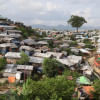
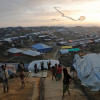
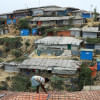
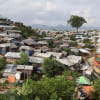
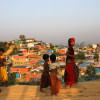


Comments